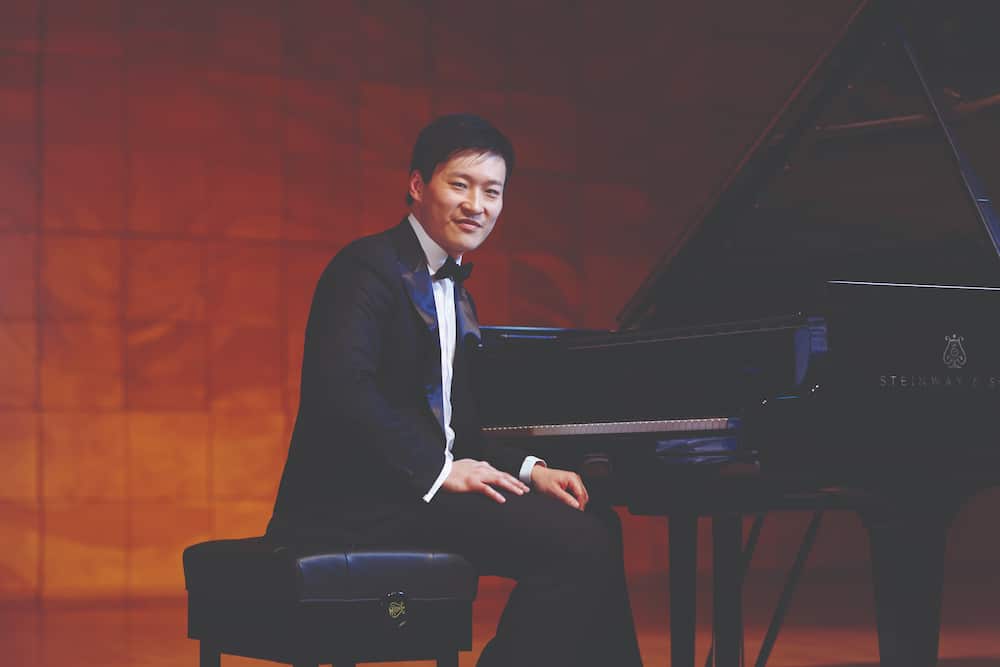War and Peace, the Canberra Symphony Orchestra’s concert this month, encompasses two centuries of German heroism and defeat: Metamorphosen, Richard Strauss’s moving lamentation for German culture, and Beethoven’s mighty Third Symphony, the Eroica, the revolutionary symphony that began the Romantic age. A too-seldom performed Australian piece, Malcolm Williamson’s Second Piano Concerto, bridges the two works.
“The whole evening will take our audiences through two of the greatest and most profound works in classical music, with a palate cleanser of Williamson,” CSO chief conductor and artistic director Jessica Cottis said.
Strauss’s Metamorphosen (1946), a piece for 23 solo strings, is, Strauss expert Michael Kennedy wrote, “an elegy, profoundly moving and inspired, for the destruction of the German culture which had inspired Strauss”.
At the end of World War II, Strauss wrote in his diary: “The most terrible period of human history is at an end, the 12-year reign of bestiality, ignorance, and anti-culture under the greatest criminals, during which Germany’s 2,000 years of cultural evolution met its doom.”
Once Germany’s most celebrated 20th century composer, the Nazi regime and war had been an ordeal for Strauss. Forced to collaborate with the Nazis, “these barbarians”, to protect his Jewish daughter-in-law and grandchildren, he was unable to save her other relations; Die schweigsame Frau, his opera with Jewish writer Stefan Zweig, and perhaps the warmest-hearted comic opera since the 19th century, had been banned; and he was forced to resign from presidency of the Reichsmuskikkammer when the Nazis intercepted a letter he wrote to Zweig criticising their racial ideology.
Towards the end of the war, many of Germany’s most venerable opera houses lay in rubble, including Dresden (where nine of Strauss’s operas premiered, among them Salome, Elektra, and Der Rosenkavalier) and Vienna (where Die Frau ohne Schatten was born). When the Munich opera house was bombed in 1944, Strauss wrote a few bars entitled ‘Mourning for Munich’. These became the germ of Metamorphosen.
Metamorphosen showcases the CSO’s string section, led by concertmaster Kirsten Williams.
“A deeply felt, elegiac piece … it revolves as a single, half-hour span of continually shifting textures,” Cottis said. “It’s such beautiful music. Perhaps I could describe it as ‘painfully beautiful’. The final bars use a theme from an earlier funeral march, from the third movement of Beethoven’s Eroica, yet the work ends with a sense of hope, for rebirth or renewal.”
Internationally acclaimed Australian pianist Kristian Chong will perform Williamson’s Second Piano Concerto, composed in eight days in 1960. The piece, Williamson wrote, was “an overtly Australian work aiming at spontaneity and vigour rather than profundity”.
“It’s a peaceful, friendly, highly tuneful work, full of spontaneity and vigour,” Cottis said. “Very infrequently performed (I’m not sure why, it’s a great work!), I think our audiences will love this.”
“This concerto has a unique harmonic palette,” Chong said. “The opening movement is lively and quite explosive, whilst the second movement has a beautiful sense of warmth and sincerity in the textures and melodic lines.”
Many CSO supporters will remember Chong from his utterly captivating performance of Rachmaninoff’s Rhapsody on a Theme of Paganini in 2016, Ms Cottis said.
“We’re delighted he joins us again! Kristian plays with such impeccable clarity, brilliance, energy, and joy. I’m sure his performance of Malcolm Williamson’s effervescent piano concerto will be one of the highlights of our season.”
The concert ends with Beethoven’s monumental Third Symphony (1805), which musicologists Joseph Kerman and Alan Tyson consider “an authentic ‘watershed work’: one that marks a turning point in the history of modern music”. Twice as long as the Classical symphonies of Mozart or Haydn, it builds on the post-French Revolutionary style of Méhul and, above all, the mighty Cherubini, whom Beethoven considered the greatest living composer of his time.
Beethoven conceived the work as a tribute to the revolutionary hero, Napoleon Bonaparte, then First Consul of France, whom he compared to the greatest consuls of Ancient Rome. But when Napoleon declared himself Emperor in 1804, Beethoven tore in half the title-page bearing a dedication to Napoleon. “So, he is no more than a common mortal!” Beethoven angrily exclaimed. “Now, too, he will tread under foot all the rights of Man, indulge only his ambition; now he will think himself superior to all men, become a tyrant!” The finished symphony Beethoven instead dedicated to ‘the memory of a great man’.
“Great depths of idealism and disillusionment are held in the harmonic climax, as the music climbs to an astonishingly high point of tension,” the CSO state. “Beethoven had hoped that Napoleon would inspire a humanist, egalitarian Europe; with a powerful and startlingly original dissonance based on F major, the composer issues his own call to revolution, condemning greed, oppression and the lust for power.
“Although the symphony has no coherent story, it really captures a heroic spirit, and everything builds towards the emphatic and triumphant finale,” Cottis said. “It’s a thrilling work.”
The concert will be conducted by Sam Weller, making his CSO debut. In 2016, Weller founded Ensemble Apex, hailed as “one of the most exciting new ensembles on the Sydney scene” (Limelight).
“This will be a very dynamic and contrasting concert,” Weller said. “Both the CSO and I look forward to sharing our artistic vigour with Canberra locals.”
War and Peace will be performed at the Llewellyn Hall, ANU School of Music, on Wednesday 14 and Thursday 15 September 7.30pm. Proudly presented by Canberra Daily. Tickets: adult $54-$101; concession $48-$89; under 30 $30; student rush $15. For more information, visit cso.org.au



